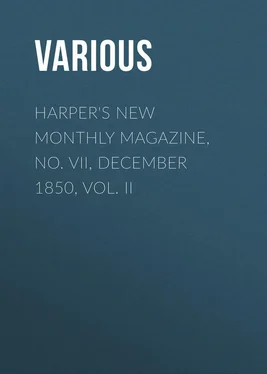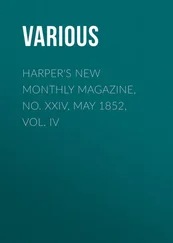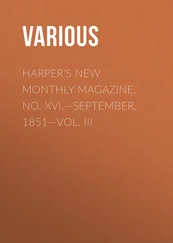Various - Harper's New Monthly Magazine, No. VII, December 1850, Vol. II
Здесь есть возможность читать онлайн «Various - Harper's New Monthly Magazine, No. VII, December 1850, Vol. II» — ознакомительный отрывок электронной книги совершенно бесплатно, а после прочтения отрывка купить полную версию. В некоторых случаях можно слушать аудио, скачать через торрент в формате fb2 и присутствует краткое содержание. Издательство: Иностранный паблик, Жанр: periodic, foreign_edu, на английском языке. Описание произведения, (предисловие) а так же отзывы посетителей доступны на портале библиотеки ЛибКат.
- Название:Harper's New Monthly Magazine, No. VII, December 1850, Vol. II
- Автор:
- Издательство:Иностранный паблик
- Жанр:
- Год:неизвестен
- ISBN:нет данных
- Рейтинг книги:4 / 5. Голосов: 1
-
Избранное:Добавить в избранное
- Отзывы:
-
Ваша оценка:
- 80
- 1
- 2
- 3
- 4
- 5
Harper's New Monthly Magazine, No. VII, December 1850, Vol. II: краткое содержание, описание и аннотация
Предлагаем к чтению аннотацию, описание, краткое содержание или предисловие (зависит от того, что написал сам автор книги «Harper's New Monthly Magazine, No. VII, December 1850, Vol. II»). Если вы не нашли необходимую информацию о книге — напишите в комментариях, мы постараемся отыскать её.
Harper's New Monthly Magazine, No. VII, December 1850, Vol. II — читать онлайн ознакомительный отрывок
Ниже представлен текст книги, разбитый по страницам. Система сохранения места последней прочитанной страницы, позволяет с удобством читать онлайн бесплатно книгу «Harper's New Monthly Magazine, No. VII, December 1850, Vol. II», без необходимости каждый раз заново искать на чём Вы остановились. Поставьте закладку, и сможете в любой момент перейти на страницу, на которой закончили чтение.
Интервал:
Закладка:
Various
Harper's New Monthly Magazine, No. VII, December 1850, Vol. II
THE DESERTED VILLAGE
Sweet Auburn! loveliest village of the plain,
Where health and plenty cheer'd the laboring swain,
Where smiling spring its earliest visit paid,
And parting summer's lingering blooms delay'd —
Dear lovely bowers of innocence and ease,
Seats of my youth, when every sport could please —
How often have I loiter'd o'er thy green,
Where humble happiness endear'd each scene;
How often have I paus'd on every charm —
The sheltered cot, the cultivated farm,
The never failing brook, the busy mill,
The decent church that topp'd the neighboring hill,
The hawthorn bush with seats beneath the shade
For talking age and whispering lovers made;
How often have I bless'd the coming day
When toil remitting lent its turn to play,
And all the village train from labor free,
Led up their sports beneath the spreading tree —
While many a pastime circled in the shade,
The young contending as the old survey'd,
And many a gambol frolick'd o'er the ground,
And sleights of art and feats of strength went round:
And still, as each repeated pleasure tir'd,
Succeeding sports the mirthful band inspir'd —
The dancing pair that simply sought renown
By holding out to tire each other down,
The swain mistrustless of his smutted face
While secret laughter titter'd round the place,
The bashful virgin's sidelong looks of love,
The matron's glance that would those looks reprove.
These were thy charms, sweet village! sports like these,
With sweet succession, taught even toil to please;
These round thy bowers their cheerful influence shed;
These were thy charms – but all these charms are fled.
Sweet smiling village, loveliest of the lawn,
Thy sports are fled, and all thy charms withdrawn;
Amid thy bowers the tyrant's hand is seen,
And desolation saddens all thy green:
One only master grasps the whole domain,
And half a tillage stints thy smiling plain.
No more thy glassy brook reflects the day,
But chok'd with sedges works its weedy way;
Along thy glades, a solitary guest,
The hollow-sounding bittern guards its nest;
Amid thy desert-walks the lapwing flies,
And tires their echoes with unvaried cries;
Sunk are thy bowers in shapeless ruin all,
And the long grass o'ertops the mouldering wall;
And, trembling, shrinking from the spoiler's hand,
Far, far away thy children leave the land.
Ill fares the land, to hastening ills a prey,
Where wealth accumulates and men decay;
Princes and lords may flourish, or may fade —
A breath can make them, as a breath has made;
But a bold peasantry, their country's pride,
When once destroy'd, can never be supplied.
A time there was, ere England's griefs began,
When every rood of ground maintain'd its man:
For him light labor spread her wholesome store,
Just gave what life requir'd, but gave no more;
His best companions, innocence and health,
And his best riches, ignorance of wealth.
But times are altered; trade's unfeeling train
Usurp the land, and dispossess the swain:
Along the lawn, where scatter'd hamlets rose,
Unwieldy wealth and cumbrous pomp repose:
And every want to opulence allied,
And every pang that folly pays to pride.
These gentle hours that plenty bade to bloom,
Those calm desires that ask'd but little room,
Those healthful sports that grac'd the peaceful scene,
Liv'd in each look and brighten'd all the green —
These, far departing, seek a kinder shore,
And rural mirth and manners are no more.
Sweet Auburn! parent of the blissful hour,
Thy glades forlorn confess the tyrant's power.
Here, as I take my solitary rounds
Amid thy tangling walks and ruin'd grounds,
And, many a year elaps'd, return to view
Where once the cottage stood, the hawthorn grew —
Remembrance wakes with all her busy train,
Swells at my breast, and turns the past to pain.
In all my wanderings round this world of care,
In all my griefs – and God has given my share —
I still had hopes, my latest hours to crown,
Amid these humble bowers to lay me down;
To husband out life's taper at the close,
And keep the flame from wasting by repose.
I still had hopes, for pride attends us still,
Amid the swains to show my book-learn'd skill —
Around my fire an evening group to draw,
And tell of all I felt, and all I saw;
And as an hare, whom hounds and horns pursue,
Pants to the place from whence at first she flew,
I still had hopes, my long vexations pass'd,
Here to return – and die at home at last.
O bless'd retirement, friend to life's decline,
Retreats from care, that never must be mine!
How happy he who crowns, in shades like these,
A youth of labor with an age of ease;
Who quits a world where strong temptations try —
And, since 'tis hard to combat, learns to fly.
For him no wretches, born to work and weep,
Explore the mine, or tempt the dangerous deep,
No surly porter stands, in guilty state,
To spurn imploring famine from the gate;
But on he moves, to meet his latter end,
Angels around befriending virtue's friend —
Bends to the grave with unperceiv'd decay,
While resignation gently slopes the way —
And, all his prospects brightening to the last,
His heaven commences ere the world be pass'd.
Sweet was the sound, when oft at evening's close
Up yonder hill the village murmur rose.
There as I pass'd, with careless steps and slow,
The mingling notes came soften'd from below:
The swain responsive as the milkmaid sung,
The sober herd that low'd to meet their young,
The noisy geese that gabbled o'er the pool,
The playful children just let loose from school,
The watch-dog's voice that bay'd the whispering wind,
And the loud laugh that spoke the vacant mind —
These all in sweet confusion sought the shade
And fill'd each pause the nightingale had made.
But now the sounds of population fail,
No cheerful murmurs fluctuate in the gale,
No busy steps the grass-grown footway tread,
For all the bloomy flush of life is fled —
All but yon widow'd, solitary thing,
That feebly bends beside the plashy spring,
She, wretched matron – forced in age, for bread,
To strip the brook with mantling cresses spread,
To pick her wintry faggot from the thorn,
To seek her nightly shed, and weep till morn —
She only left of all the harmless train,
The sad historian of the pensive plain!
Near yonder copse, where once the garden smil'd,
And still where many a garden-flower grows wild —
There, where a few torn shrubs the place disclose,
The village preacher's modest mansion rose.
A man he was to all the country dear;
And passing rich with forty pounds a year.
Remote from towns he ran his godly race,
Nor e'er had chang'd, nor wish'd to change, his place;
Unpractic'd he to fawn, or seek for power
By doctrines fashion'd to the varying hour.
Far other aims his heart had learn'd to prize —
More skill'd to raise the wretched than to rise.
His house was known to all the vagrant train,
He chid their wanderings, but reliev'd their pain:
The long remember'd beggar was his guest,
Whose beard descending swept his aged breast;
The ruin'd spendthrift, now no longer proud,
Claim'd kindred there, and had his claims allow'd.
The broken soldier, kindly bade to stay,
Sat by his fire, and talk'd the night away —
Wept o'er his wounds, or, tales of sorrow done,
Shoulder'd his crutch and show'd how fields were won.
Pleas'd with his guests, the good man learn'd to glow,
And quite forgot their vices in their woe;
Careless their merits or their faults to scan,
Интервал:
Закладка:
Похожие книги на «Harper's New Monthly Magazine, No. VII, December 1850, Vol. II»
Представляем Вашему вниманию похожие книги на «Harper's New Monthly Magazine, No. VII, December 1850, Vol. II» списком для выбора. Мы отобрали схожую по названию и смыслу литературу в надежде предоставить читателям больше вариантов отыскать новые, интересные, ещё непрочитанные произведения.
Обсуждение, отзывы о книге «Harper's New Monthly Magazine, No. VII, December 1850, Vol. II» и просто собственные мнения читателей. Оставьте ваши комментарии, напишите, что Вы думаете о произведении, его смысле или главных героях. Укажите что конкретно понравилось, а что нет, и почему Вы так считаете.












